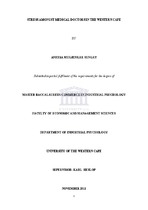| dc.description.abstract | Numerous theories were established as to why doctors are leaving the country. A collection of stressors have presented itself and are seen as the contributing factors that lead to the outflow of doctors to other countries. Masia et al (2010) suggest that heavy workloads, after hour calls, conflicts between work and personal lives, and dealing with life and death situations are stressors that form part of the daily routine of medical practitioners as well as financial pressures, insufficient budgets, a challenging working environment, information overload and threats of litigation can threaten the health and well-being of the medical practitioner. Various reasons contributed to doctor's leaving the country and can be explained and addressed by the push-pull theory of migration. Investigations were conducted to identify the reasons for doctors leaving the country. The significant push factors that were identified as most frequently noted in investigations were poor remuneration and wages, lack of job satisfaction, lack of future prospects (further education and career development), poor working conditions, HIV/AIDS, lack of quality of life, high levels of crime and violence, civil conflict and political instability, and a decline in the quality of the school education system. Relevant non-financial incentives shown to be significant in retaining medical practitioners include support, teamwork and feedback from supervisors. Training and recognition was also noted by medical practitioners as deciding factors on whether to stay in a rural area. South Africa has witnessed a major outflow of doctors that have left the country to seek employment elsewhere and has been seen as a potential problem for the near future. However, not enough research has been conducted to study the various sources of stress and determine ways in which to combat these stressors. This study aims to present an understanding of the various sources of stress that doctors face on a daily basis and also distinguish between various coping mechanisms. A sample of 150 doctors was used for the purpose of this study and was selected primarily from 3 Western provincial hospitals. Informed consent was obtained from the relevant authorities before participating in the study. A 36-item Stressor Checklist and a Ways of coping checklist, which were adapted from previous research, were administered. No significant differences in sources of stress were found, although males evaluated their experiences as being more stressful. Significant differences were, however, obtained in terms of coping mechanisms utilised. Female doctors had a greater propensity to utilise problem and appraisal-focused coping. However, males were more apt to utilise avoidance-coping. The research findings indicate a need for further research to be done, and can be highly beneficial for the purpose of therapeutic intervention. | en_US |

